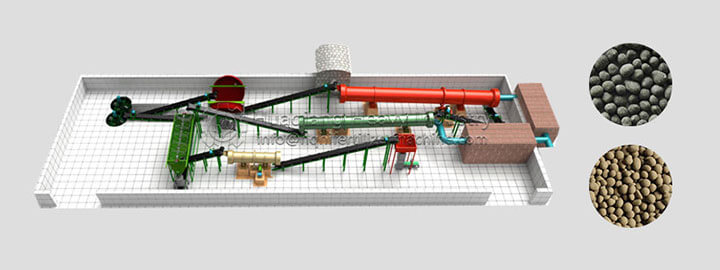Tank fermentation granulation organic fertilizer for sheep manure organic fertilizer equipment production line
Tank fermentation granulation organic fertilizer for sheep manure organic fertilizer equipment production line
Sheep manure organic fertilizer is a kind of organic fertilizer specially treated by sheep's incompletely digested organic matter. It is suitable for the geological improvement of alkaline land and barren land, and has a good effect on improving crop yield. Because sheep is a ruminant and rarely drink water, the feces are dry and fine, and the amount of feces is also small. Sheep manure organic fertilizer is a thermal fertilizer between horse manure and cow manure.
Fermentation technology of sheep manure organic fertilizer
Precautions during fermentation of sheep manure organic fertilizer production line
1. Particle size of raw materials: the particle size of sheep dung and auxiliary raw materials should be less than 10mm, otherwise they need to be crushed;
2. Suitable material moisture: the suitable fermentation humidity of compost microorganism is 50~60%, and the suitable humidity is 60~65%, so the material moisture is adjusted to about 55~60%. When the water content reaches more than 65%, there is a high probability that the dead tank will not ferment.
3. Control of sheep dung and auxiliary materials: according to local agricultural conditions, organic materials such as straw, corn stalk, peanut stem can be used as auxiliary materials. The ratio of sheep manure and auxiliary materials can be adjusted according to the requirements of fermentation water (generally 3:1). The raw materials with the carbon and nitrogen ratio of 20~80:1 can be selected as the composting auxiliary materials. Therefore, common organic substances such as dry rice straw, corn stalk, deciduous leaves, soybean stem, peanut stem, etc. in rural areas can be used as auxiliary materials for compost fermentation after being crushed.
4. Fermentation cycle: after sheep dung, auxiliary materials and inoculation materials are mixed in the tank, the first time they are turned over, which is recorded as the start time of the fermentation cycle. Generally, after a heating period of 3 to 4 days (5 to 7 days in winter), they enter the high-temperature fermentation stage. Based on the temperature, when the reactor temperature exceeds 60-70 ℃ for more than 24 hours, the reactor can be turned over. The times of turning over vary with the seasons. The fermentation cycle is generally 15 days in summer and 25 days in winter.
5. If the temperature in the fermentation tank has not exceeded 40 ℃ after entering the tank for 10 days, it can be determined that the tank is dead and the fermentation start fails. At this time, the water content in the tank must be measured. If the water content exceeds 60%, auxiliary materials and inoculation materials need to be added; If the moisture content is lower than 60%, consider whether the amount of inoculation material is not enough.
The manufacturer will work with you to ensure that your production line meets your needs and your financial needs. A good fertilizer production line is going to save you money and help you get started producing fertilizer so much faster. Your profits are going to improve fast when you start using this production line.
评论
发表评论